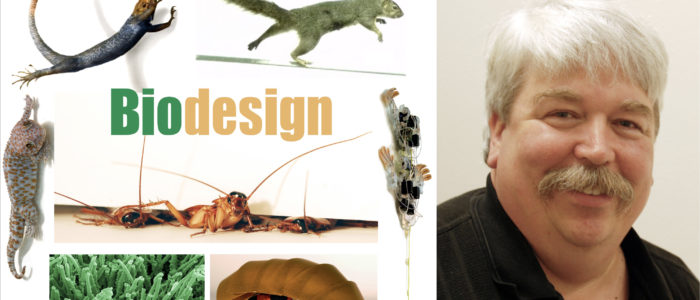ABSTRACT
BioDesign is an exemplar of convergence integrating knowledge, tools, and ways of thinking and interacting from biology, engineering, physics, and applied mathematics to form a comprehensive synthetic framework for addressing scientific and societal challenges that exist at the interfaces of many traditional disciplines. Now more than ever before, biodiversity can instruct us on how to best use new materials and manufacturing processes, because these human technologies have more of the characteristics of life. We can use principles of energy management discovered in legged locomotion, inertial assisted control shown by tails of leaping lizards, robustness seen in the exoskeletal material of compressed cockroaches entering cervices, fibrillar adhesion observed in geckos racing up trees, and learning by squirrels launching off branches. Although biodiversity offers enormous potential for novel designs, extracting principles is challenging because natural selection is not engineering. To share approaches to these challenges, we developed an education program that connects two recent revolutions, biodesign with the maker movement’s democratizing effects. Our i4’s Toward Tomorrow Program (http://biodesign.berkeley.edu) seeks to expand the STEAM workforce with an early, inspirational and interdisciplinary experience fostering inclusive excellence. Using culturally sustaining connections, students envision a future where diverse minds are urgently needed for involvement, imagination, invention and innovation (i4). The program aims to remove artificial, disciplinary boundaries by including designers, artists, social scientists, and entrepreneurs collaborating in diverse teams using biological discoveries to invent their future.
Robert J. Full is a Howard Hughes Medical Institute Professor in the Department of Integrative Biology and Electrical Engineering and Computer Science at the University of California at Berkeley. Professor Full has led an international effort to demonstrate the value of integrative biology and biological inspiration by the formation of interdisciplinary collaborations among biologists, engineers, and mathematicians from academia and industry. Professor Full is founder and director of CiBER (
http://ciber.berkeley.edu), the Center for interdisciplinary Bio-inspiration in Education and Research, the Editor-in-Chief of the journal Bioinspiration and Biomimetics (
http://iopscience.iop.org/journal/1748-3190), a science advisory board member of the new journal, Science Robotics, and serves on the advisory boards of Switzerland’s National Centre of Competency in Research – Robots, Harvard’s Wyss Institute for Biologically Inspired Engineering, and the National Academies of Sciences, Engineering, and Medicine’s Board of Life Sciences. Professor Full’s programmatic theme is Diversity Enables Discovery. He directs the Poly-PEDAL Laboratory (
http://polypedal.berkeley.edu), which studies the Performance, Energetics and Dynamics of Animal Locomotion (PEDAL) in many-footed creatures (Poly), such as cockroaches, crabs, and lizards. His discoveries of fundamental principles in motion science have led to the design of animal inspired control circuits, artificial muscles, legged robots, and self-cleaning, dry adhesives. His efforts in education research have led to discovery- and design-based courses, including his new Bioinspired Design course (
http://biodesign.berkeley.edu/bioinspired-design-course/), featured in his i4’s Toward Tomorrow Program (
http://biodesign.berkeley.edu) focusing on inclusive excellence. Professor Full received a NSF Presidential Young Investigator Award, Berkeley’s Distinguished Teaching Award, was named a Mentor in the Life Sciences by the National Academies of Sciences, and was elected to the American Association for the Advancement of Science, and the American Academy of Arts and Sciences under the new category, Emerging Fields.


Comments are closed.